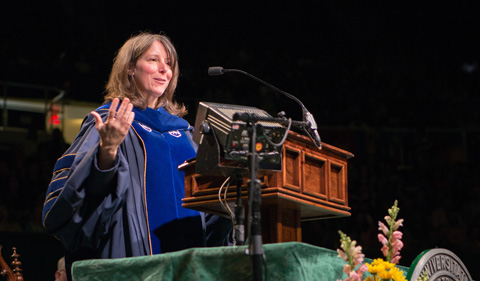
Dr. Risa Whitson, Associate Professor of Geography and the Women’s, Gender, and Sexuality Studies Program delivers the graduate commencement address. Photo by Ben Siegel
From Compass
Informal work—and how it is “counted”—is an important in changing economic structures and gender performances, said Dr. Risa Whitson, Associate Professor of Geography and in the Women’s, Gender, and Sexuality Studies program. She was the keynote speaker at the Graduate Commencement on April 28.
Most of her research is based in contemporary Argentina and the United States. During her speech, Whitson shared some thoughts on the importance of counting.
“My research for a number of years was focused on informal work. So in basic terms, this is ‘under the table’ work, work that is not reported to or regulated by the government as work, but passes unnoticed,” Whitson said. “In some ways the definition of informal work is work that is ‘not counted’ by the government.”
She said that many times this work is not counted because the workers or their employers do not want it to be counted, and it is often not recognized as work. She told the story of an informal garbage collector in Buenos Aires, Argentina, who said he was ashamed to do it and would rather work as a carpenter or as a painter.
“I’m ashamed, to go into the street with my kids, collecting trash. I’m ashamed for my kids,” the man told her.
Whitson said that although the garbage collector was ashamed of his work, it was a really important and common source of work for many people because it was the only way recycling was occurring in Buenos Aires.
“So from this perspective, this informal work was making a really valuable contribution to the city and to the environment,” Whitson said. “But it was informal, uncounted and unrecognized.
Even more than this, it was marginalized and even criminalized.”
She said that story shows how counting something as work is a recognition of its meaningfulness to society.
“Thinking about what counts as work is only the first step in asking, who counts as a contributing member of our society? Whose lives count as important? Do undocumented migrants count? Do black lives count? Do people who identify as transgender count? Do people with disabilities count? Who matters to our society? Who is valued by our society?” Whitson asked.
She said that what our governments, organizations and institutions decide to count is fundamentally important to how we think about ourselves as individuals and our place in the world.
Whitson then asked, “What if we counted differently?”
“One of the most important aspects of this counting culture is that what we choose to count as an institution is connected to who we see ourselves as being,” Whitson said. “We define ourselves by what we count – so that the goals of the organization or institution that we work for become our own yardsticks for measuring ourselves and our self-worth.”
Whitson asked the question, “What if, instead of counting articles published or grants applied for, we counted thank you notes received, friendships formed, collaborations forged?”
She said that two years ago she started counting what mattered in her work differently. She started responding to her students with love.
“I recall telling my colleagues that my strategy for the coming year was, even with grading, was to approach the task with love. They looked at me like I was totally crazy, and maybe I was,” Whitson said.
She said she started counting the relationships she made with students, collaborators and research participants as important and approached them not as potential numbers in a metric, but as human beings.
“I think that this approach made a difference in my life, made me a better researcher and teacher, and I hope it made a difference in the lives of my students as well,” Whitson said. “I realized that what has been most meaningful to me as a professor has been my own personal version of informal, invisible, uncounted work. My ‘informal’ work as a mother, friend and community member.”
Whitson reminded the graduates that they came to graduate school because they believed that something was important enough to dedicate two, five or 10 years, or maybe even their whole life to.
“For many of you, this comes from a desire to change the world, to make it a better place, to help people in the many and various ways that this is possible,” she said. “But how do we do this? How can we actually change the world?”
She told them to keep asking does this count?
“Make sure you are asking the right person that question. Instead of asking your professor, your employer, the state, or whoever, ask yourself. What counts? Who do you want to be? What kind of world do you want to live in? What and how we count creates the people and society that we will become.


















Comments